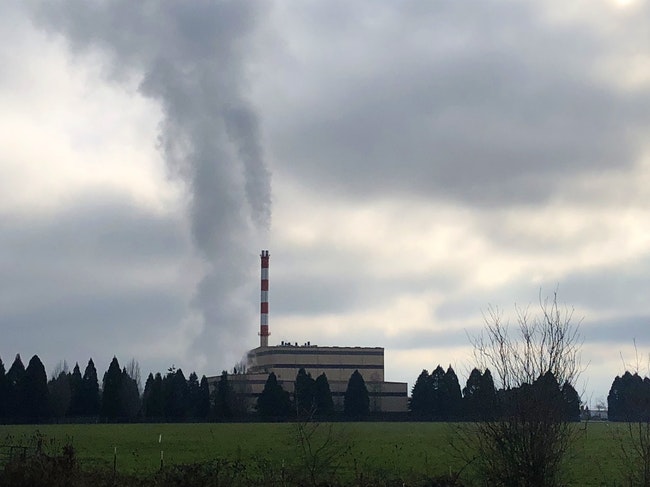 Covanta Marion, a trash incinerator in Brooks, burns roughly 170,000 tons of garbage every year. (Troy Brynelson/Salem Reporter)
Covanta Marion, a trash incinerator in Brooks, burns roughly 170,000 tons of garbage every year. (Troy Brynelson/Salem Reporter)
Special legislation Marion County says it needs to keep the Brooks waste-incineration facility operating and garbage rates from rising has stalled.
House Bill 4049 would have made a waste-to-energy facility eligible for Oregon’s renewable energy tax credits. Covanta, the New Jersey company that owns the facility, has said the tax incentives would cover rising maintenance costs at the 32-year-old plant. Marion County officials have said that ratepayers may see increases without the legislation.
However, the fate of the legislation is now uncertain.
On Thursday, members of the House Committee on Energy and Natural Resources sharply criticized the bill for assigning tax credits to an already profitable company. The committee sent the bill to the House Rule Committee, which is not subject to the same legislative deadlines as other committees.
Rep. Karin Power, a Milwaukie Democrat who chairs the energy committee, said doing so would buy more time to work out issues with the bill. She said the move was requested by Rep. Brian Clem, a Salem Democrat who helped bring the bill before lawmakers. Clem didn’t respond Friday to a request for comment.
But Power noted that most witnesses opposed the bill and that she had her own “significant questions and concerns.”
“The entities that have testified in favor of receiving renewable energy certificates have largely stood to profit from those renewable energy certificates, which has given me a little bit of pause,” she said.
Power referenced a recent report finding that the facility is millions of dollars behind in upkeep and maintenance. While working on the bill, she said she found the company’s financial statements showing that the company was 150% above shareholder expectations in the third quarter of last year, she said. The company earned $465 million in the last quarter of 2019, she added.
Rep. Ken Helm, D-Washington County, expressed similar reservations about giving tax credits to a profitable company based out of state. But he said giving the legislation extra time to help the county was warranted and he’d vote the bill to the Rules Committee as a courtesy.
Rep. Marty Wilde, D-Eugene, said he would vote “no” on moving the bill because the company didn’t respond to his request for information.
“I’m not interested in providing welfare to shareholders,” he said.
Legislative documents don’t state how much the bill would cost the state.
Covanta officials didn’t respond to a request a telephone messages seeking comment.
In a statement, Marion County Commissioner Colm Willis thanked Power for moving the bill to the Rules Committee and was hopeful the Legislature would honor the county’s “investment in this renewable energy source.”
“Thirty years ago, Marion County took a risk and invested in the development of an energy-from-waste facility,” he said. “This partnership has allowed the county to establish one of the most comprehensive and environmentally friendly waste management systems in Oregon.”
Contact reporter Jake Thomas at 503-575-1251 or [email protected] or @jakethomas2009.









